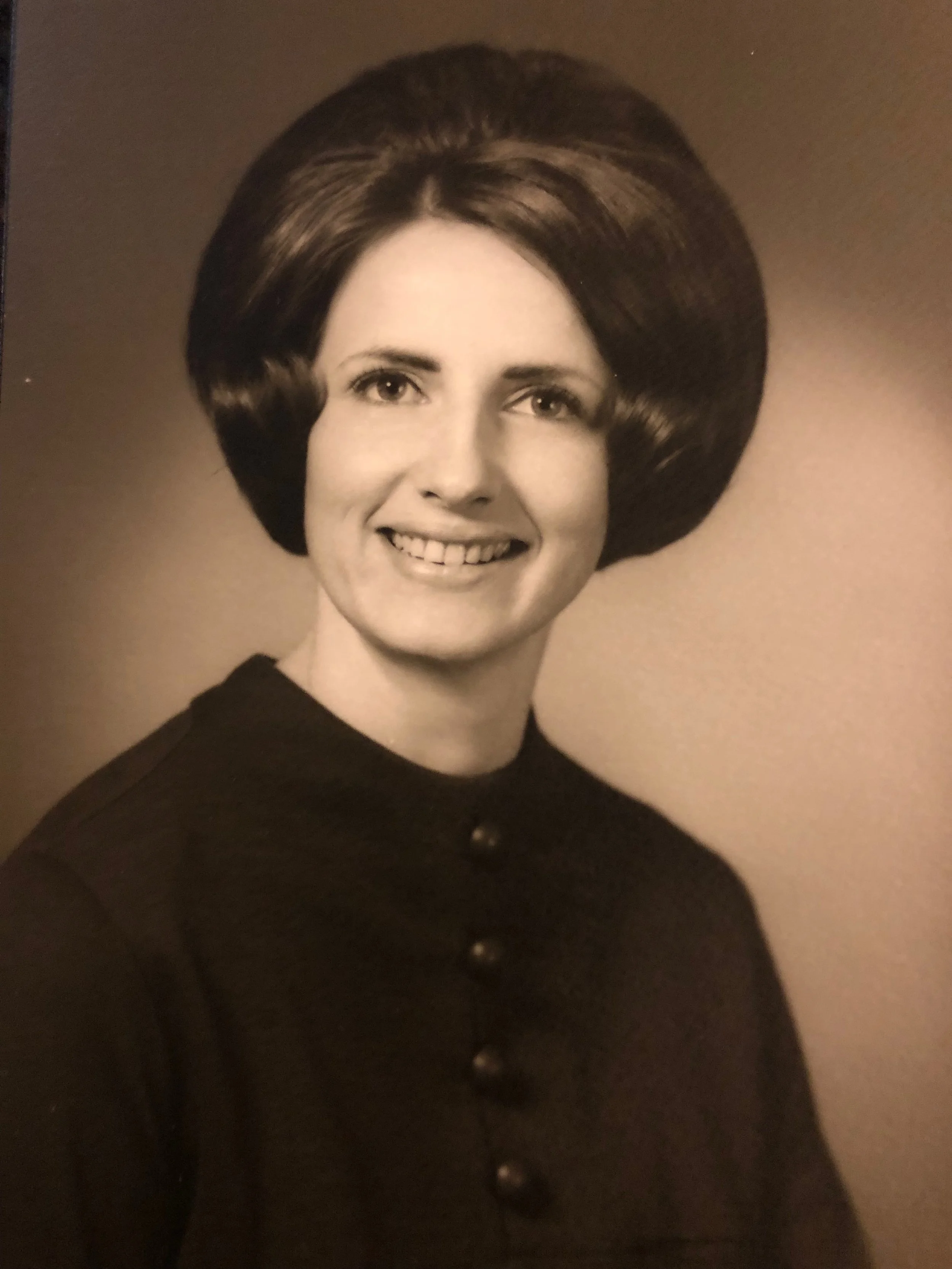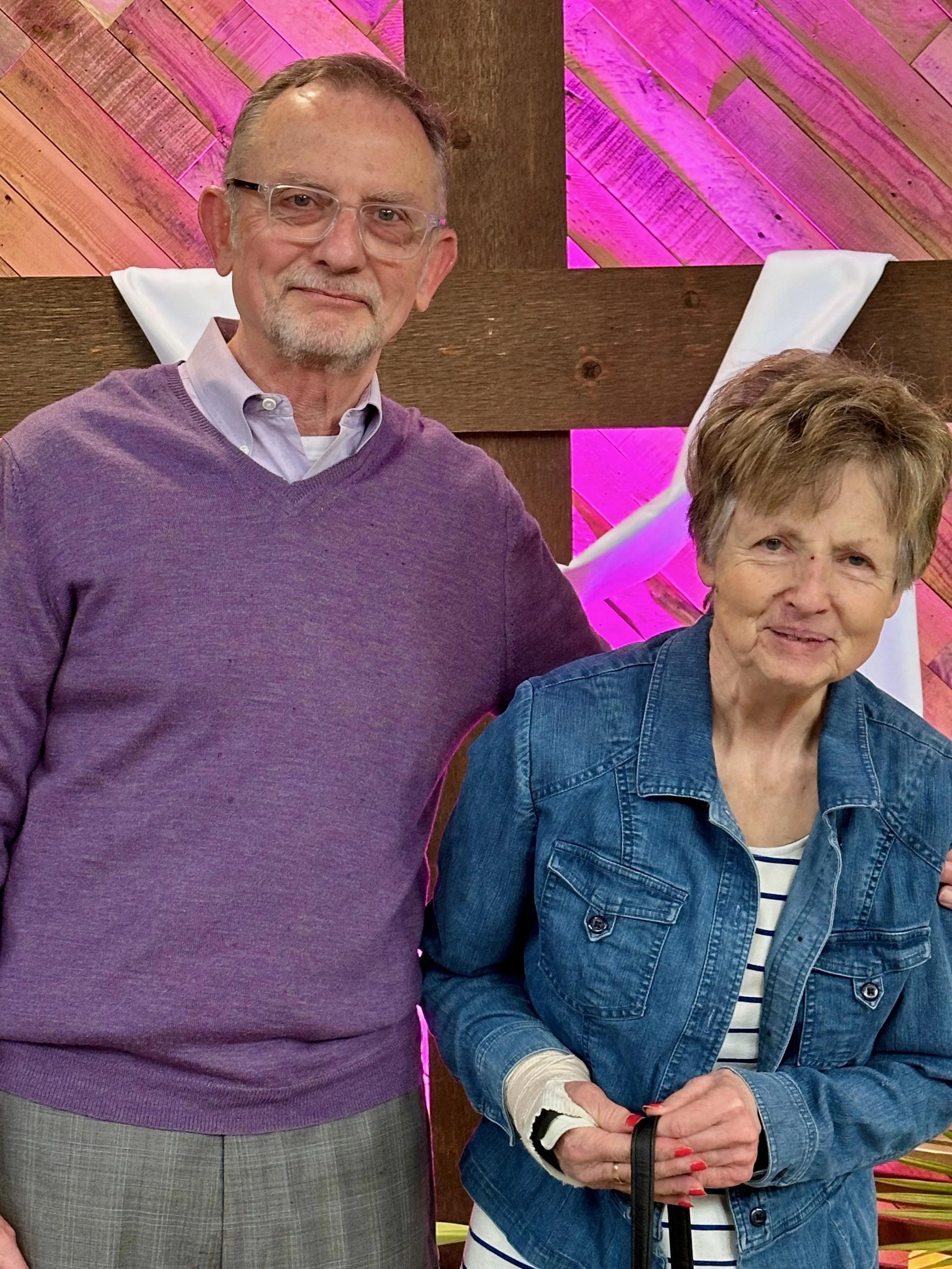An easy question with no simple answer: Why am I doing this?
I almost always comb Evelyn’s hair when I go to visit her, and I’m trying to decide why. There are many possibilities.
Maybe it’s because her hair was always important to her.
It usually looked perfect, even at the beach or while mowing the grass. Nowadays, her hair is one of the first things I notice when I come to see her. Her aides comb it every morning when they get her ready for the day. Sometimes I don’t like what they’ve done with it.
How would she feel to look in the mirror on those days?
Maybe it’s because her hair was always important to me.
Not that I ever thought about it. I took it for granted because it was always right. But from the first day I met her, I was struck by how pretty Evelyn is. And her 1970s coif was an important part of the picture.
Evelyn’s engagement picture, 1972.
I was never sure what she saw in me. She was the epitome of feminine beauty; I was skinny and unathletic, and my ears stick out. I was always so proud to be seen with her. The very fact of her beside me gave me confidence.
How do I see myself if I sit beside her while she’s disheveled with a cowlick?
Maybe it’s because I’m still clinging to the past. (I realize I hearkened to days long ago in the paragraphs above.)
Evelyn was always so much more than her appearance. Like a perfect dessert, she offered flavor and sweet surprise. We stayed for the cake, to be sure, but it was the icing that got our attention. Now that the depth and nuance have disappeared, I’m holding on to what’s left: the possibility of a pleasant appearance highlighted by pleasing hair.
How will I cope when we can no longer keep her looking nice?
Maybe it’s because keeping up appearances was important to me when Evelyn started failing.
I worked to put together her outfits I remembered from days past. She helped me, saying yes or no to the possibilites I showed her when I was getting her ready for church. In the last couple of years she was home, we went to the beauty shop every Friday to have her hair washed and set so it would look nice for the weekend.
Easter Sunday, 2024, just two days before she moved to Artis.
Soon people learned that Evelyn was sick, but I didn’t want her to look that way. Like a parent eager for their child to impress in public, I wanted folks to see Evelyn at her best. I said it was for her dignity. In fact, it was also for my pride.
Am I embarrassed now if visitors see her looking like an old woman slumped in a wheelchair in a nursing home? If she’s pretty and put together, does her appearance distract me from the tragedy sitting before us?
Maybe it’s to soften the piercing grief that accompanies what I’m losing.
In at least one moment most days, the reality of the loss is almost too much to bear. But she hasn’t lost her hair; it’s still thick and easy to style, with very little gray. We still have that. And in fleeting, treasured moments, we also still have her pretty smile.
My kids were in town this weekend, and our friend Sev asked me how it went when we visited Evelyn. Frankly, it was difficult, I told her. “But she was alert,” I added. “And she gave us some smiles.”
“Her smiles always make me smile,” Sev said. And then she texted me a paragraph from a book she was reading, Tomorrow and Tomorrow and Tomorrow, by Gabrielle Zevin:
“She had, he thought, one of the world’s great laughs. The kind of laugh where a person didn’t feel that he was being laughed at. The kind of laugh that was an invitation: I cordially invite you to join in this matter that I find amusing.”
And then Sev added, “For many years, even decades, I have thought this about Evelyn. I was forever after that laugh when we were together.”
June 2017
I wrote back to Sev, “Well, with that text, you brought tears to my eyes!”
“We all miss things about her,” Sev responded. “Sometimes they are acutely brought to mind. When I read this passage, I had to stop for the day.”
She added that some might hesitate to tell what they miss or remember about Evelyn, to protect themselves (or me) from being sad. “But I think talking about it is so important to keep those things alive.”
Maybe combing Evelyn’s hair is a simple way to affirm she’s still alive.
Today we’re struggling through a no-man’s-land between life and death; it’s the curse of every Alzheimer’s caregiver. The only way we cope is by holding on to as many shreds of the past as possible.
Even if Evelyn doesn’t think to care about her hair these days, where would I be—who would I be—if her appearance no longer mattered to me?


